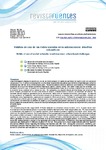Mostrar o rexistro simple do ítem
Hábitos de uso de las redes sociales en la adolescencia: desafíos educativos
| dc.contributor.author | Dans Álvarez de Sotomayor, Isabel | |
| dc.contributor.author | Muñoz-Carril, Pablo-César | |
| dc.contributor.author | González-Sanmamed, Mercedes | |
| dc.date.accessioned | 2022-01-11T12:44:51Z | |
| dc.date.available | 2022-01-11T12:44:51Z | |
| dc.date.issued | 2021 | |
| dc.identifier.citation | Dans Álvarez-de-Sotomayor, I., Muñoz Carril, P.-C., & González Sanmamed, M. (2021). Hábitos de uso de las redes sociales en la adolescencia: desafíos educativos. Revista Fuentes, 23(3), 280–295. https://doi.org/10.12795/revistafuentes.2021.15691 | es_ES |
| dc.identifier.uri | http://hdl.handle.net/2183/29350 | |
| dc.description.abstract | [Resumen] Esta investigación analiza los hábitos de uso de las redes sociales por parte del alumnado de cuarto curso de Educación Secundaria (14 a 16 años) con el propósito de vislumbrar las acciones educativas que conviene desarrollar para evitar los problemas que derivan de su empleo inadecuado. Para la recogida de datos se aplicó un cuestionario a 1144 estudiantes españoles en el que se incluían cuestiones relativas a cuánto, cuándo, dónde, con quién y para qué se conectan. Los resultados indicaron que los jóvenes se conectan fundamentalmente fuera de la escuela y administran con autonomía la duración de su conexión en su tiempo de ocio. Se demuestra una relación directa entre el tiempo de conexión a las redes sociales y el abandono de otras actividades de estudio, entretenimiento e, incluso, de relaciones de amistad. Se detectan efectos negativos generados por la desconexión, tales como el malestar emocional y psicológico. La mayoría de sus contactos se establecen con un número elevado de personas de su misma edad y entorno próximo. Además, se manifiestan como espectadores y partícipes de situaciones ofensivas en la red. Prefieren no compartir redes sociales con su profesorado y tienen opinión dispar respecto a la formación que pueden ofrecerle los docentes. Entre las conclusiones, se insiste en que identificar los perfiles de usuario y los problemas que pueden derivarse de las prácticas de uso de las redes sociales en la adolescencia, resulta de vital importancia para diseñar acciones educativas de prevención y educación en la era digital. | es_ES |
| dc.description.abstract | [Abstract] This research analyzes the usage habits of Social Networks by secondary school students (14 to 16 years old) in order to understand the educational actions to avoid the problems that derive from their inappropriate use. For data collection, a questionnaire was applied to 1144 spanish students, which included questions regarding how much, when, where, with whom and for what they connect. The results indicated that young people connect primarily outside the school and manage the duration of their connection in their leisure time with autonomy. It demonstrates a direct relationship between the times spent on social media and the abandonment of other activities of study, entertainment and even friendships. Negative effects generated by disconnection are detected, such as emotional and psychological distress. Most of his contacts were made with a large number of people of the same age and similar environment. Furthermore, they manifest themselves as spectators and participants in offensive situations on the Net. They prefer not to share social networks with their teachers and have a different choice regarding the training that teachers can offer them. Among the conclusions, identifying user profiles and problems that may arise from their Social Networks in adolescence is of vital importance to design educational actions for prevention and education in the digital age. | es_ES |
| dc.description.sponsorship | Este trabajo se ha elaborado en el marco del proyecto de investigación titulado: “Ecologías de aprendizaje en la era digital: nuevas oportunidades para la formación del profesorado de educación secundaria” (ECO-4LEARN-SE), parcialmente financiado por el Ministerio de Ciencia, Innovación y Universidades (Referencia RTI2018-095690-B-I00) | es_ES |
| dc.language.iso | spa | es_ES |
| dc.relation | info:eu-repo/grantAgreement/AEI/Plan Estatal de Investigación Científica y Técnica y de Innovación 2017-2020/RTI2018-095690-B-I00/ES/ECOLOGIAS DE APRENDIZAJE EN LA ERA DIGITAL: NUEVAS OPORTUNIDADES PARA LA FORMACION DEL PROFESORADO DE EDUCACION SECUNDARIA | |
| dc.relation.uri | https://doi.org/10.12795/revistafuentes.2021.15691 | es_ES |
| dc.rights | Atribución-NoComercial-CompartirIgual 4.0 Internacional | es_ES |
| dc.rights.uri | http://creativecommons.org/licenses/by-nc-sa/4.0/ | * |
| dc.subject | Redes sociales | es_ES |
| dc.subject | Adolescencia | es_ES |
| dc.subject | Enseñanza secundaria | es_ES |
| dc.subject | Estudiantes | es_ES |
| dc.subject | Relaciones entre pares | es_ES |
| dc.subject | Ocio | es_ES |
| dc.subject | Acoso | es_ES |
| dc.subject | Social networks | |
| dc.subject | Adolescence | |
| dc.subject | Lower secondary education | |
| dc.subject | Students | |
| dc.subject | Peer relationship | |
| dc.subject | Leisure | |
| dc.subject | Bullying | |
| dc.title | Hábitos de uso de las redes sociales en la adolescencia: desafíos educativos | es_ES |
| dc.title.alternative | Habits of Use of Social Networks in Adolescence: Educational Challenges | es_ES |
| dc.type | info:eu-repo/semantics/article | es_ES |
| dc.rights.access | info:eu-repo/semantics/openAccess | es_ES |
| UDC.journalTitle | Revista Fuentes | es_ES |
| UDC.volume | 23 | es_ES |
| UDC.issue | 3 | es_ES |
| UDC.startPage | 280 | es_ES |
| UDC.endPage | 295 | es_ES |
| dc.identifier.doi | 10.12795/revistafuentes.2021.15691 |
Ficheiros no ítem
Este ítem aparece na(s) seguinte(s) colección(s)
-
GI-EIRA - Artigos [30]






